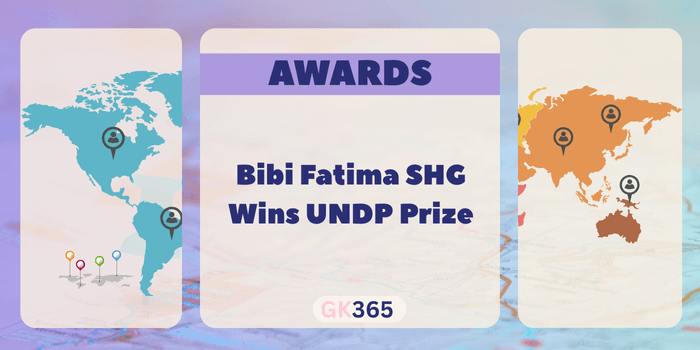Bibi Fatima Women’s SHG Wins UNDP Equator Prize 2025 for Biodiversity Conservation and Sustainable Farming
The Bibi Fatima Women’s Self-Help Group (SHG) from Teertha village, Kundgol taluk, Dharwad district, Karnataka, has won the Equator Prize 2025 from the United Nations Development Programme (UNDP). Often called the “Nobel Prize for Biodiversity Conservation,” the award recognizes the group’s role in eco-friendly farming, biodiversity protection, millet revival, and women-led rural enterprises.
Table of Contents
- About the Equator Prize
- Theme of 2025: Women and Youth Leadership
- The Journey of Bibi Fatima SHG
- Key Achievements of the Group
- Role of Partnerships in Scaling Work
- National and Global Significance
- Challenges Faced by the SHG
- Why This Award Matters for India
- Looking Ahead: Future Plans of the SHG
- Conclusion
- Key Takeaways Table
About the Equator Prize
The UNDP Equator Prize is a global recognition for grassroots innovation in biodiversity and sustainable development.
- Presenter: United Nations Development Programme
- Purpose: Honors local communities offering nature-based climate and development solutions
- Theme for 2025: “Women and Youth Leadership for Nature-Based Climate Action”
- Scale: Nearly 700 nominations from 103 countries
- Winners: Ten communities worldwide, including from Argentina, Brazil, Ecuador, Indonesia, Kenya, Papua New Guinea, Peru, Tanzania, and India
- Prize: $10,000 (~₹8.5 lakh) and international recognition
- Announcement: August 9, 2025, on the International Day of the World’s Indigenous Peoples
The award places the Bibi Fatima SHG among global grassroots champions driving eco-friendly development.
Theme of 2025: Women and Youth Leadership
This year’s award highlights the role of women and youth in climate action. The recognition of the Bibi Fatima SHG shows how rural women can transform farming, biodiversity, and enterprise.
The Journey of Bibi Fatima SHG
Formation and Origins
Formed in 2018 by 15 women in Teertha village, the group began with the goal of improving livelihoods through farming. Over time, it grew into a leader in sustainable agriculture.
Mentoring and Collaborations
The SHG received mentoring from Sahaja Samruddha, which promotes seed diversity and organic farming. Key collaborations included:
- Indian Institute of Millets Research (IIMR) – millet promotion
- CROPS4HD – crop diversity for nutrition
- Selco Foundation – solar-powered millet processing
- Devadhanya Farmer Producer Company – rural enterprise and market access
These partnerships provided science, technology, and market support.
Key Achievements of the Group
Eco-Friendly Farming in Rainfed Lands
The group adopted organic fertilizers, natural pest control, and mixed cropping, reducing costs and improving drought resilience.
Community Seed Banking
They created a seed bank to preserve traditional varieties, ensuring diversity and reducing reliance on hybrid seeds.
Millet Promotion and Processing
The SHG revived millets as “nutri-cereals.” With Selco’s solar units, they process and market flour, snacks, and mixes, adding value and income.
Rural Enterprises and Market Linkages
Through Devadhanya, the SHG entered wider markets. Branding their produce as natural and healthy helped meet urban demand while creating rural income opportunities.
Role of Partnerships in Scaling Work
The SHG’s progress shows how grassroots leadership, combined with support from NGOs, research institutes, and renewable energy providers, can build sustainable enterprises.
National and Global Significance
The award highlights:
- Millet Movement: Alignment with India’s push for millet-based nutrition.
- Women-Led Enterprises: Validation of women as entrepreneurs and conservation leaders.
- Global Relevance: Local eco-friendly models addressing climate change and food insecurity.
Challenges Faced by the SHG
- Limited access to premium markets
- Erratic rainfall and climate risks
- Financial hurdles in processing and branding
- Lack of visibility in policy discussions
The award provides recognition and funding to help address these barriers.
Why This Award Matters for India
India is rich in biodiversity but faces rural poverty and climate threats. The award underscores:
- The value of women-led SHGs in rural growth
- The importance of seed diversity and millet promotion
- The role of renewable energy in rural enterprises
It positions India as a global voice in grassroots climate solutions.
Looking Ahead: Future Plans of the SHG
The SHG plans to:
- Expand millet-based product lines
- Extend the seed bank to more villages
- Train other women’s groups in sustainable practices
- Strengthen digital market links
- Install more solar units to scale production sustainably
Conclusion
The Bibi Fatima Women’s SHG winning the UNDP Equator Prize 2025 is a landmark for India. Their work in eco-friendly farming, millet revival, and rural enterprise shows how grassroots women can lead global solutions.
The $10,000 prize and global visibility will help expand their work, inspire other rural groups, and highlight India’s role in biodiversity and climate action.
Their story proves that lasting innovation often starts at the grassroots—with farmers, women, and local communities shaping the future of food and ecology.
Key Takeaways Table
| Aspect | Details |
|---|---|
| Award | UNDP Equator Prize 2025 – “Nobel Prize for Biodiversity Conservation” |
| Theme 2025 | Women and Youth Leadership for Nature-Based Climate Action |
| Group Formation | Bibi Fatima SHG, founded in 2018 by 15 women in Karnataka |
| Key Achievements | Eco-friendly farming, community seed bank, millet processing, rural market linkages |
| Partnerships | Sahaja Samruddha, IIMR, CROPS4HD, Selco Foundation, Devadhanya FPC |
| Challenges | Climate risks, limited markets, financial barriers, low policy visibility |
| Significance | Strengthens India’s millet movement, empowers women entrepreneurs, provides global recognition |
| Future Plans | Expand seed banks, train more women, strengthen digital markets, add solar units |



